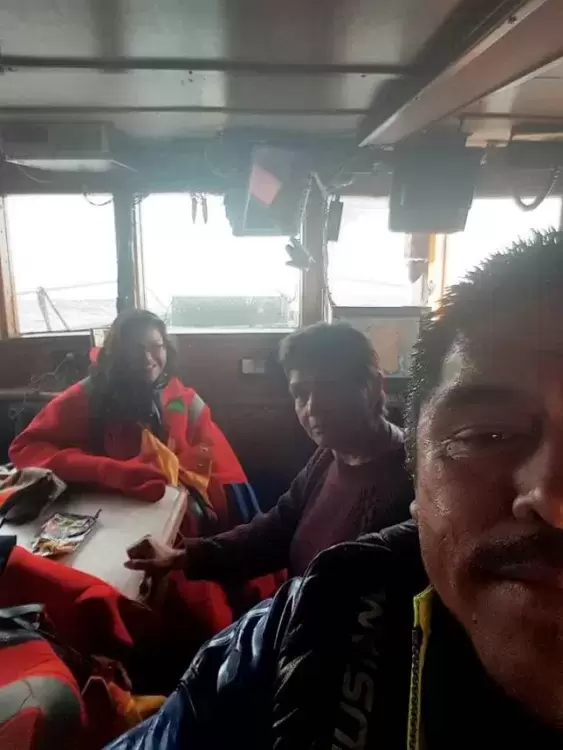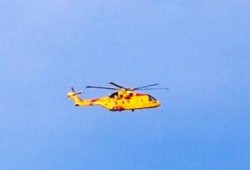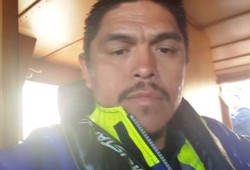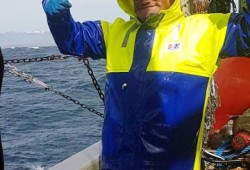A routine fishing trip nearly turned tragic for five people from Ahousaht when a malfunction in their steering line caused the boat to run in circles, taking on water in choppy seas.
A spokesperson from the Joint Rescue Coordination Centre (JRCC) – Victoria said that they received a distress call from the 40-foot fishing vessel, Storm Dodger at about 7:30 p.m. on Sunday, June 25. The report said the boat was taking on water with five people aboard. It has since been confirmed that there were six people aboard.
Boat owner Albert Frank and his deckhand Ken Brown, along with other crew members, worked franticly to bail water out of the cockpit while simultaneously troubleshooting the steering system.
For fisherman Ken Brown, this is not his first emergency situation. Back in October 2015, on a Sunday afternoon, he was fishing off of Flores Island when he noticed an emergency flare in the distance. It came from the crew of the Leviathan II, a commercial whale watching vessel which had capsized, tossing 27 passengers and crew into the frigid ocean.
Brown and his fishing partner, Clarence Smith, were first on the scene of the accident. They called for help and began pulling survivors out of the water.
Six lives were lost that day, but it could have been much, much worse if Brown and Smith hadn’t noticed the flare.
And it was another quiet Sunday afternoon that Brown faced his own off-shore emergency.
“I was fishing as a deckhand on Storm Dodger this past weekend and we had a faulty scupper and our power steering line was leaking hydraulic fluid,” he said.
There were six people aboard: Skipper Albert Frank, Ken Brown, the skipper’s mother Gloria Jean Frank, his teenage children Angeline and Calvin Frank and a deckhand named Chris.
“Four of us were icing fish below deck when ma (Gloria Jean) yelled, you guy get out of there!” Brown recalled. “I knew right away when I heard water washing over the stern that we were in trouble.”
He went on to say that he is a seasoned fisherman and as such, ensured that all of his crew mates evacuated the ice hold immediately.
“The cockpit was full of water,” wrote the skipper’s mother, Gloria Jean Frank, to Ha-shilth-sa. “The steering system was not working again...the boat was doing donuts and the cockpit was getting more water. The waves were high; white caps were all around us.”
Ken Brown said almost everyone got busy bailing the water out of the boat while he and Albert worked to fix the steering. In an effort to increase the boat’s buoyancy, he began throwing weight overboard including their day’s catch, about 500 pounds of halibut that was on deck and about 1,000 pounds of long line weight.
“After we got control of our water situation the captain’s mom and his kids were told to put on all emergency flotation equipment,” said Brown. But previous and ongoing theft of fishing gear and boat equipment from the Storm Dodger left its crew with only two survival suits. The survival suits were donned by the youngest crew members.
By then the Coast Guard was on scene. A spokesperson at the JRCC told Ha-Shilth-Sa that the Canadian Coast Guard was tasked with the rescue response. They immediately sent Canadian Coast Guard Ship Tanu, the IRB 504 (Immediate Response Boat, also known as the Zodiac) and a Cormorant Helicopter was dispatched from Canadian Forces Base Comox.
“All resources quickly got on scene; the Storm Dodger was having issues with steering so we removed four people from the boat with our IRB,” said the spokesperson. The crewmembers were taken to shore at Friendly Cove (Yuquot) while the skipper and his deckhand remained onboard to repair the vessel.
The JRCC noted that the wind was blowing at 27 knots that day with two to three meter seas.
“When you have trouble with steering, you can’t steer your bow into the waves and so it is very easy to take on water in that situation,” said the spokesperson.
Brown said they saw the four crewmembers scramble onto the IRB from the rear of the Storm Dodger.
“I stayed with captain to help in any way I could to fix our problems,” he said, adding that they eventually located the leak in the system and repaired it, while the Coast Guard worked to tow the Storm Dodger away from the reefs.
“We asked to be cut free to do a trial run with our steering line repaired and it was a successful fix,” said Brown. The Storm Dodger went on to Friendly Cove to pick up her crew before turning back home to Ahousaht.
“All’s well that ends well,” said the JRCC spokesperson.
On June 14, 2017, the TSB (Transportation Safety Board) released its report and recommendations in the wake of the Leviathan II accident. Their aim through recommended regulations is to prevent accidents but also to expedite rescue efforts if an accident occurs.
Among their three recommendations is one the urges Department of Transport expedite the proposed changes to the Navigation Safety Regulations and expand its current emergency position-indicating radio beacon (EPIRB) carriage requirements to require that all commercial passenger vessels operating beyond sheltered waters carry an EPIRB.
An EPIRB is an emergency locator beacon that is normally placed somewhere outside the boat. In the event of capsize, it is designed to break free and float on the ocean; generating signals that help rescuers locate survivors.
Currently, EPIRBs are not mandatory on all vessels but they are highly recommended.
In the case of the Storm Dodger, it is not known if the boat was equipped with an EPIRB; the skipper could not be reached for confirmation at press time. The crew aboard the vessel, however, was able to radio for help and provide the JRCC with their exact location.
“This is another experience I will never forget,” said Brown, adding that he is grateful to all that helped, including the Coast Guard and the nearby boats.
“I'm thankful and happy to be home with my kids and wife,” said Brown, adding that he loves the ocean and fishing. Even though he’s already been through a lot, he will never give up fishing.











